The Radical Theology of Mr. Rogers
Won't You Be My Neighbor
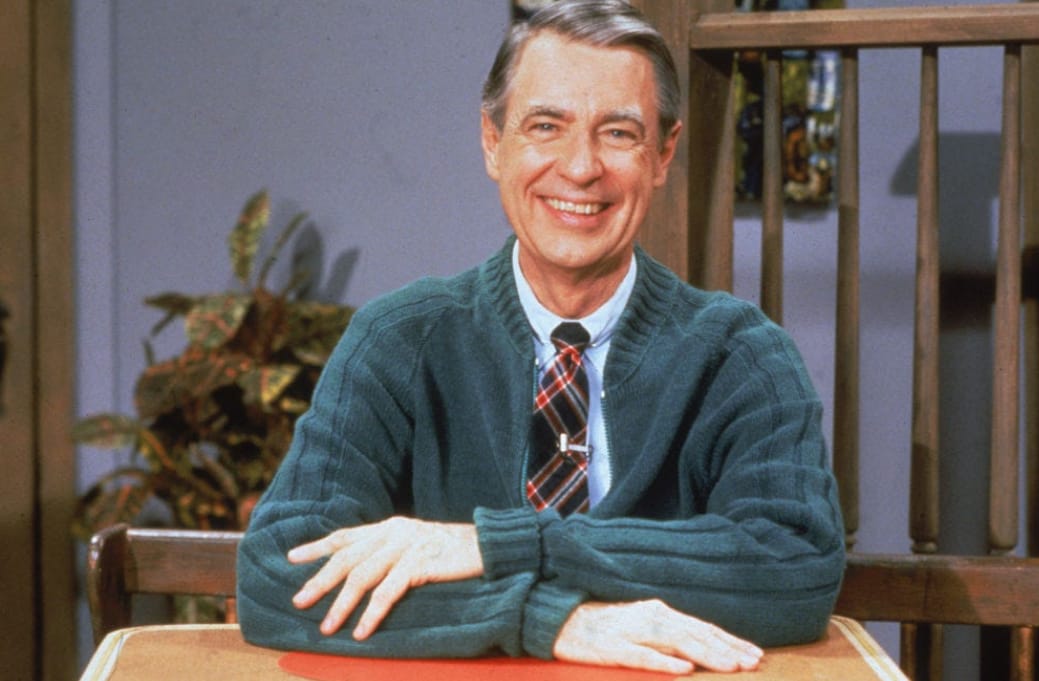
This is Life as a Sacred Text, an expansive, loving, everybody-celebrating, nobody-diminished, justice-centered voyage into one of the world’s most ancient and holy books. We’re generally working our way through Leviticus these days. More about the project here, and to subscribe, go here.🌱
Today we’re going to talk about the radical theology of Mr. Rogers.
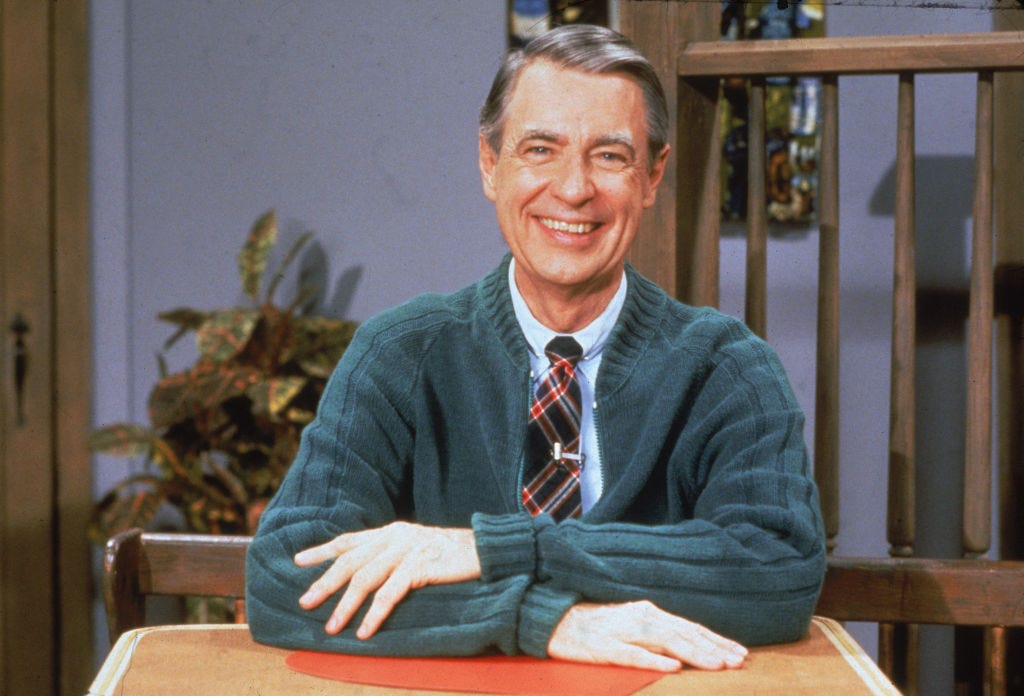
For those of you who are Zoomers and/or living outside the US, Mister Rogers' Neighborhood was a profoundly beloved kids’ TV show that ran from 1968 to 2001, and was created and hosted by Fred Rogers—may his memory be forever a blessing.
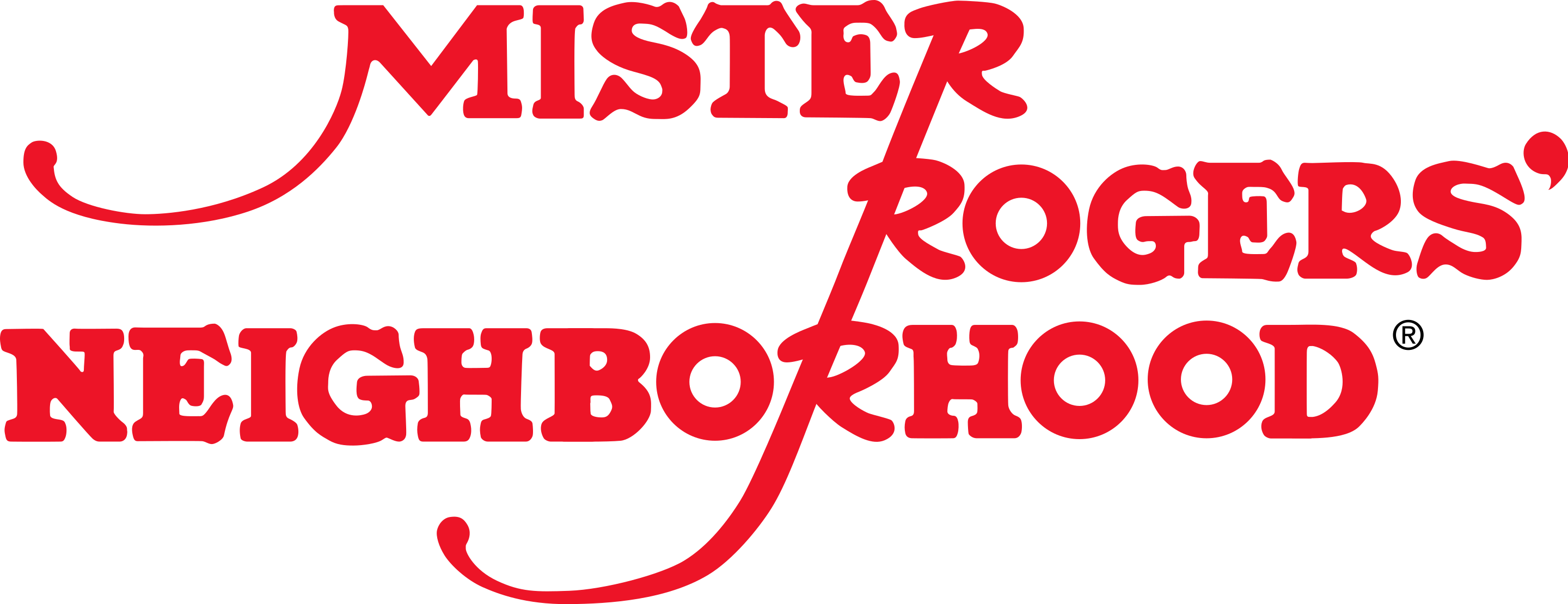
Fred Rogers was a Presbyterian minister whose life’s work was, I believe, built almost entirely (if not entirely) around Leviticus 19:18:
“Love your neighbor as yourself: I am God.”
Hence... the neighborhood.
In practice it that looked like this (all of these are his words):
“To love someone is to strive to accept that person exactly the way [they are], right here and now."
and
"Everyone longs to be loved. And the greatest thing we can do is to let people know that they are loved and capable of loving."
Rogers’ love of love was so intense that his favorite number was famously 143—since it corresponded to the number of letters in each word of “I love you.” In fact, a few years ago his home state of Pennsylvania declared the 143rd day of the year—May 23rd—to be “143 Day,” a day of kindness “inspired by PA’s favorite neighbor.”
"Love is like infinity: You can't have more or less infinity, and you can't compare two things to see if they're ‘equally infinite.’ Infinity just is, and that's the way I think love is, too," Rev. Fred Rogers
Rogers had a difficult childhood—he was shy, introverted, frequently stuck at home because of asthma, and bullied for his weight. He’d play with puppets to entertain himself. (Another, well, thread, that appears in his work later—his mother knitted sweaters for American soldiers fighting in Europe during the World Wars, and many of the ones he wore on camera were her work.1) He blossomed during high school, and after college wanted to go straight to seminary, but was drawn, somehow, to a new medium he found repugnant. For, he said:
"I went into television because I hated it so, and I thought there's some way of using this fabulous instrument to nurture those who would watch and listen."
(There are about sixteen different lessons here about leadership, innovation, and spiritual and moral wisdom in this sentence. Reread )
Eventually he did get through seminary and ordination, though, while working on the program side of Pittsburgh public television for a show called The Children’s Corner, developing many of the iconic characters we’d think of as part of Mr. Rogers’ Neighborhood. He went to Canada in ‘63 to do a 15 min show called Misterogers—the beta version, it would turn out to be—and then in 1967 came back home to Pittsburgh; Mr. Rogers’ Neighborhood launched the following year.
From the very beginning, Rogers knew that love meant talking about the hard stuff.
The very first week of the show, in 1968, while the Vietnam War was raging, he opened up a conversation to talk about war, power and politics in an entirely preschool-appropriate way:
Just addressed the thing head-on.
And when Bobby Kennedy was murdered that same year, he did something that’s pretty much impossible to our world today.
He had a puppet tiger ask an actor:
“What does ‘assassination’ mean?”
He knew that small children would be hearing this word, and that they would be aware that something major had happened. And that most of the time, when adults are preoccupied with communal tragedy and trauma, children get left out—to their own detriment.
Better they should know, in an age-appropriate way, and be given the tools to cope, than to be left out in the cold, as he put it, “at the mercy of their own imaginations.”
Again, naming true things and simply holding space to let children deal with them--rather than trying to hide or minimize or gaslight because it seems too hard.
That’s love.
As he put it.
“Love is generally confused with dependence. Those of us who have grown in true love know that we can love only in proportion to our capacity for independence."
And then in 1969, as swimming pool integration had become a major issue—including racist violence around the simple concept of Black people sharing a pool with white people—he decided to simply wash his and François Clemmons/Officer Clemmons' feet together in a kiddie pool. Look, friends sharing a pool on a hot day! How lovely that everyone can cool off.
But remember, he was a minister.
Presumably the good Rev. Rogers was fully holding the Christian meaning of foot washing in his choices.
It should also be noted that François Clemmons was gay. Rogers told him to stay away from gay bars at the time (late 60s/early 70s) because he knew that if that got out, he wouldn't be able to stay on a children's TV show. Some now might think of this as homophobic, but times really were different.
Personally2, I regard this as a gesture of love and of trying to protect Clemmons and his livelihood, and his role on the show. He didn't ask Clemmons to deny his gayness, just not to get "caught" publicly, as such a thing ruined many a career (outside kids' TV!) in those days.
And, in fact, Rev. Rogers has been quoted as saying, “Well, you know, I must be right smack in the middle. Because I have found women attractive, and I have found men attractive.”
Bisexual icon? Just a believer in radical truth? I don't know.
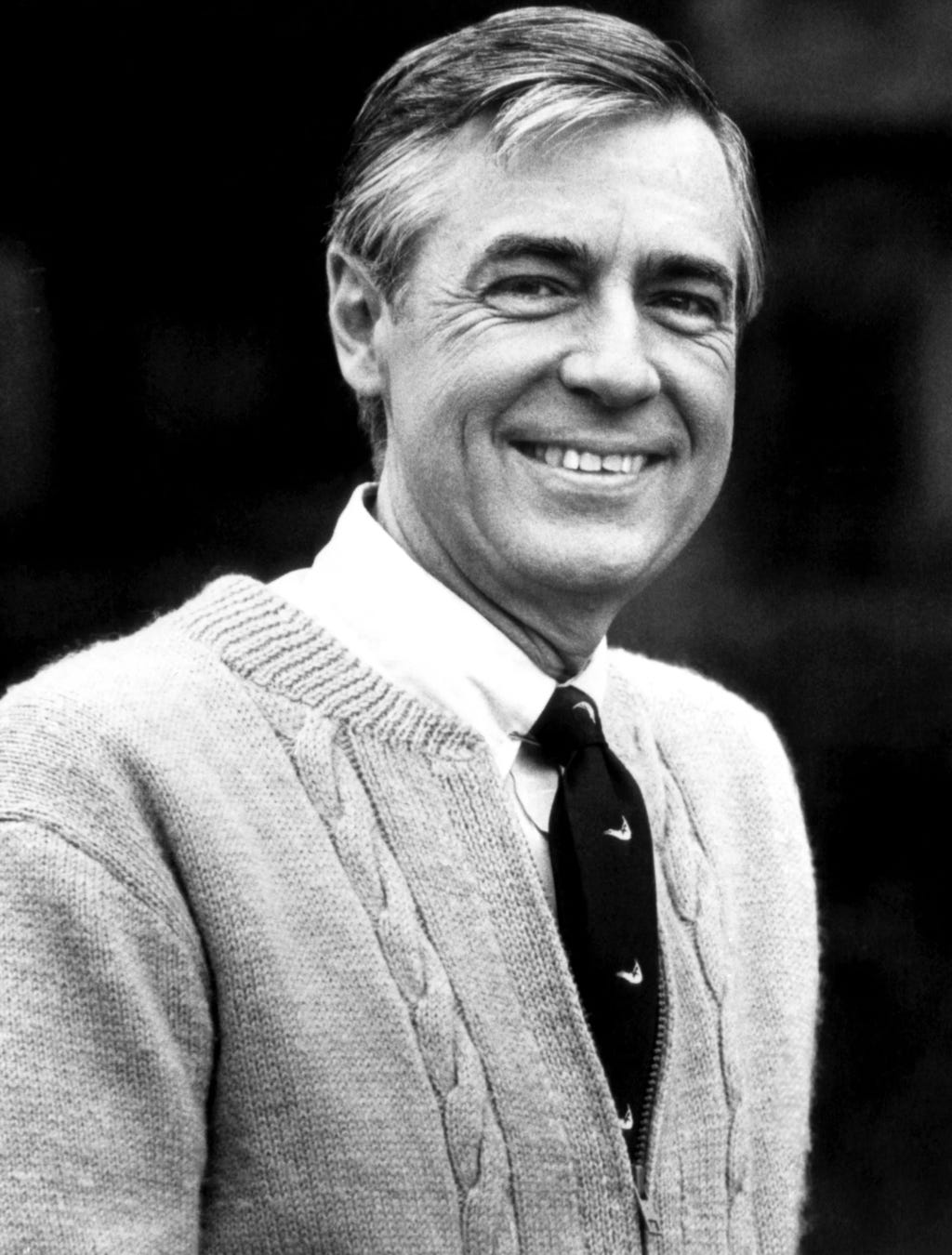
But what we do know is that the heart and soul of his work was cultivation of the soul of the developing human.
“The roots of a child's ability to cope and thrive, regardless of circumstance, lie in that child's having had at least a small, safe place (an apartment? a room? a lap?) in which, in the companionship of a loving person, that child could discover that [they were] lovable and capable of loving in return. If a child finds this during the first years of life,[they] can grow up to be a competent, healthy person.” -Rev. Fred Rogers
It's You I Like
Written by Fred Rogers | © 1971, Fred M. Rogers
It's you I like,
It's not the things you wear,
It's not the way you do your hair
But it's you I like
The way you are right now,
The way down deep inside you
Not the things that hide you,
Not your toys
They're just beside you.
But it's you I like
Every part of you.
Your skin, your eyes, your feelings
Whether old or new.
I hope that you'll remember
Even when you're feeling blue
That it's you I like,
It's you yourself
It's you.
It's you I like.
Which doesn’t mean that, for Rogers, this core was not profoundly spiritual—in ways that were clear to him, if not always explicit on the surface.
Henri Nouwen (1932-1996) was a Dutch theologian, writer and Catholic priest whose later years especially were defined by pastoral ministry. He and Rev. Rogers were good friends, speaking regularly by phone and writing often.
At some point, Rogers saw an article, presumably by someone in a Christian space, critical of his work and was upset by it. He sent it to Nouwen, looking for advice, who responded,
“I read the article you sent me and can very well understand how much that must have hurt you. It must be really painful to be confronted with a total misunderstanding of your mission and your spiritual intentions. It is these little persecutions within the church that hurt the most. I simply hope that you are not too surprised by them. They come and will keep coming precisely when you do something significant for the Kingdom….
Though we don’t (as far as I know) have the original letter, it sure sounds like he and Nouwen had discussed his spiritual intentions with the show, more than once. What he hoped it would engender. What he was trying to do. His hopes for the Kingdom.
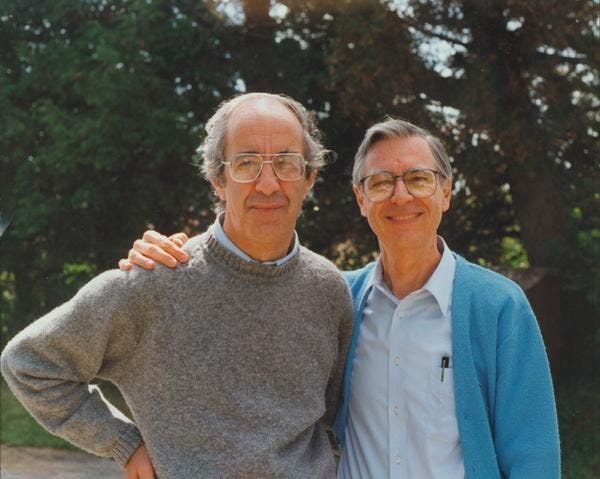
Rogers noted in a number of places that he was highly influenced by Nouwen’s theology, and after his death, wrote,
“Henri’s death has confirmed for me the enormous power of silence. Even though most of the world knows Henri best by his words, I’ve come to recognize his deepest respect for the still, small voice among the quiet of eternity. That’s what continues to inspire me.”
It was always ministry for Rogers. His work was never not a sacred task.
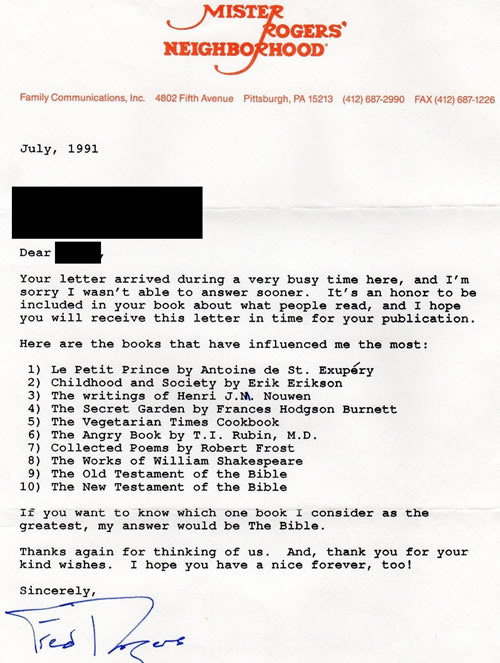
Which doesn’t mean that lighting up the souls of millions of children over decades, helping them feel seen and cared for and loved—even if they weren’t always getting that care and love at home, or at school, or in all the places that mattered—needed to be experienced by them as such.
As long as they felt loved, that was enough.
"I hope you're proud of yourself for the times you've said 'yes,' when all it meant was extra work for you and was seemingly helpful only to somebody else,"
—Rev. Fred Rogers
I believe that this was always a theological stance.
About who we are, and who God is.
“Love your neighbor as yourself: I am God.” (Leviticus 19:18)
I believe that Rev. Fred Rogers tried to love each and every one of us the way he believed God loves each and every one of us.
I believe that he saw his job as looking with a loving, empathetic eye at others and saying, as God did to Adam in the garden: "Ayeka?" Where are you?
And that his job was to wait patiently for, and to make open space for, the answer: Heneni. Here I am.
He gave over 150 commencement speeches in his time. You can just YouTube for a bunch of them and get fuel for your soul for days.
This is another beautiful investigation of Leviticus 19:18. I literally pulled it randomly out of the pile, honestly—I think they all sound like this in the sense that they teach this Torah. Because it’s who he was.
He sounds just like he does on the TV show, right? No major difference in how he speaks to adults or children, as a TV star or honored keynoter.
Because he was a fully integrated human being, the same guy everywhere he was.
There are no sides. There is just him.
Heneini. Here I am.
"Deep down, we know what matters in this life is more than winning for ourselves. What really matters is helping others win, too. Even if it means slowing down and changing our course now and again."
From the commencement speech. (Really: Listen.)
The implications of Rev. Rogers teachings on our society are truly radical.
The things he offered to children—to people—were radical for our society.
As far as I can tell, entirety of Mr. Rogers’ Neighborhood can be summed up as:
- What matters is slowing down to make sure others win, too.
- It’s OK to talk about difficult things.
- Making sure every kid is cared for, safe, fed, loved should be our number one priority.
- Cultivate empathy.
- Be curious.
- We all have hard feelings sometimes.
- And most of all, love your neighbor as yourself.
Radical activism looks like a lot of things.
Not everybody has to be yelling in the street with a sign to make change.3
There are profound ways to impact our world that, at first blush, don’t seem so radical at all. But when you take off those outside clothes and get those slippers on—a different set of possibilities begins to appear.
Your role in this work is waiting for you.
Find your way to make the world more whole and more just.
And say: Heneni.
Know that you are loved.
You have been waited for.
You can find your way home.
Now go out there and do something to manifest love for your neighbor.
🌱🌱🌱🌱🌱🌱🌱🌱🌱🌱🌱🌱🌱🌱🌱🌱🌱🌱🌱🌱🌱🌱🌱🌱🌱
Like this? Get more of it in your inbox every week. 🌱
For free every Monday—sign up at the ‘Subscribe now’ button just below.
And if you become a paid subscriber, that's how you can get tools for deeper transformation, a community for doing the work, and support the labor that makes these Monday essays happen.
A note on the subscription model:
I want my work to be as accessible to as many people as possible, in as many ways as possible. That's why the Monday essays are free, and why we donate subscriptions to anyone for whom paying is a barrier to the House of Study posts.
I also believe people should be paid fairly for their work. Needless to say, these two values sometimes seem to be in conflict, but I do what I can to find a fair balance. I offer many resources for free, and charge for others. When you donate generously or pay at the top of our scale, that helps support the work I do, provides access for those who have fewer resources, pays for the infrastructure and the technical and practical support that it takes to do this, and helps us keep the work sustainable.
And as always, if you want in to the Thursday space but paying isn't for you now, just email support@lifeisasacredtext.com and we'll hook you up.
And if you’d like to underwrite one of these donated subscriptions, you can do so by signing up at one of the higher subscription points.
And if it resonated with you, please share this post.
Sending a big pile of blessings and goodness your way. 💕
Thanks to the folks in comments who confirmed my hunch about this, and to Rev. Dr. Micah Jackson for sending me DATA! Aka graphed color of every sweater he wore on the show from 1979 to 2001. ↩
Speaking as a Medium-Old Queer ↩
No knock on direct action! One of my personal fave modalities, y’all. A great tool in the arsenal. But we won’t get there if we only approach from the north tower. We need to surround this toxic culture from all sides. ↩




